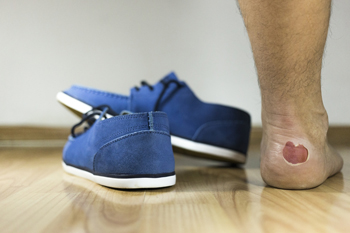
A blister is a fluid-filled bubble that forms on the skin. The fluid can be clear or contain blood. If blisters develop between the toes, it can cause pain, particularly the longer one spends on their feet. The two main types of blisters on or between the toes are those from friction and those not due to friction. Friction or pinch blisters are more common and result from toes repeatedly rubbing against each other or against the shoe lining, irritating the skin. These are related to the shape and alignment of toes, fit of shoe, and usually form near the tip of the toe or by the base of the toe. Sweaty toes are more apt to lead to friction blisters. Blisters not due to friction can develop from an infection (like athlete’s foot), a skin condition, a sunburn, or an allergy. Both types of blisters might look the same. However, the location of the blister and what causes it can help determine the type. Non-friction blisters should be evaluated by a podiatrist. With both types of blisters, good foot hygiene can help prevent them. Popping or picking at blisters should be avoided as broken skin can attract bacteria, which can cause an infection. If you have a blister on or between your toes and you are not sure of the cause, it appears infected, or if it is not healing well, contact a podiatrist for an evaluation and treatment options.
Blisters are prone to making everyday activities extremely uncomfortable. If your feet are hurting, contact one of our podiatrists of East Ocean Podiatry . Our doctors can provide the care you need to keep you pain-free and on your feet.
Foot Blisters
Foot blisters develop as a result of constantly wearing tight or ill-fitting footwear. This happens due to the constant rubbing from the shoe, which can often lead to pain.
What Are Foot Blisters?
A foot blister is a small fluid-filled pocket that forms on the upper-most layer of the skin. Blisters are filled with clear fluid and can lead to blood drainage or pus if the area becomes infected.
How Do Blisters Form?
Blisters on the feet are often the result of constant friction of skin and material, usually by shoe rubbing. Walking in sandals, boots, or shoes that don’t fit properly for long periods of time can result in a blister. Having consistent foot moisture and humidity can easily lead to blister formation.
Prevention & Treatment
It is important to properly care for the affected area in order to prevent infection and ease the pain. Do not lance the blister and use a Band-Aid to provide pain relief. Also, be sure to keep your feet dry and wear proper fitting shoes. If you see blood or pus in a blister, seek assistance from a podiatrist.
If you have any questions, please feel free to contact our office located in Deerfield Beach, FL . We offer the newest diagnostic and treatment technologies for all your foot care needs.
